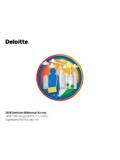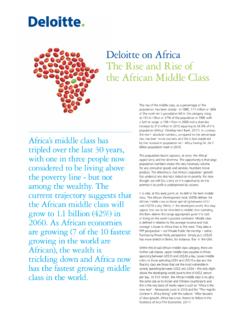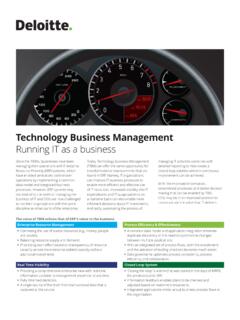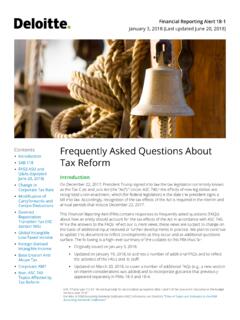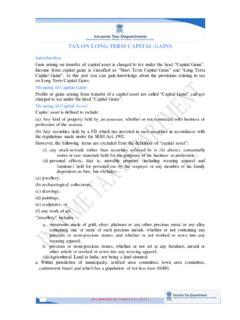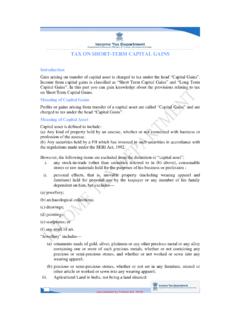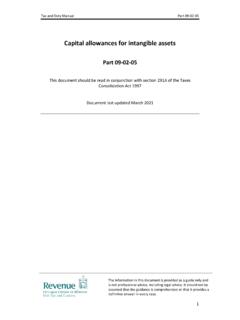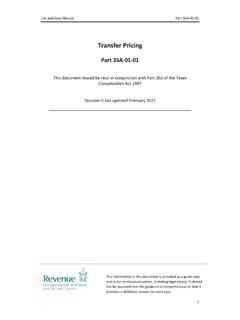Transcription of Mauritius Highlights 2020 - Deloitte
1 Page 1 of 6 International Tax Mauritius Highlights 2020 Updated February 2020 Investment basics: Currency Mauritian Rupee (MUR) Foreign exchange control There is no foreign exchange control. Accounting principles/financial statements IAS/IFRS. Financial statements must be filed annually. Principal business entities These are the private and public limited liability company, sole proprietorship, branch of a foreign company, and soci t . Corporate taxation: Rates Corporate income tax rate 15% Branch tax rate 15% capital gains tax rate 0% Residence A company is resident if (i) it is incorporated in Mauritius , or (ii) it has its central management and control in Mauritius . However, a company incorporated in Mauritius will be treated as nonresident if it is centrally managed and controlled from outside Mauritius . Basis Residents are taxed on worldwide income; nonresidents are taxed only on Mauritius -source income. Branches are taxed in the same way as subsidiaries.
2 Taxable income Income tax is imposed on a company's chargeable income, which consists of business/trading profits and passive income. Normal business expenses are deductible in computing taxable income. Rate The standard rate is 15%. Companies exporting goods are subject to tax at 3% on the chargeable income attributable to exports. Surtax There is no surtax. Alternative minimum tax There is no alternative minimum tax. Mauritius Highlights 2020 Page 2 of 6 Taxation of dividends Dividends paid by a Mauritius -resident company are exempt from income tax. Foreign dividends are taxable, but a credit may be claimed for underlying tax and withholding tax. capital gains No tax is imposed on capital gains in Mauritius . Losses Losses may be carried forward for five years, except for losses arising from annual allowances on capital expenditure incurred on or after 1 July 2006, which may be carried forward indefinitely. The carryback of losses is not permitted.
3 Foreign tax relief Foreign tax paid may be credited against Mauritius tax payable on the same income. Until 30 June 2021, a company holding a Category 1 Global Business License issued prior to 16 October 2017 (GBC 1 company) is entitled to claim a credit for the greater of the actual foreign tax incurred or a deemed foreign tax credit equivalent to 80% of the Mauritius tax payable, resulting in a maximum effective tax rate of 3%. A company issued a GBC 1 license after 16 October 2017 may claim a credit only in respect of the actual foreign tax incurred. An 80% partial exemption is available for certain types of foreign-source income for income tax purposes if prescribed conditions are fulfilled. Where the partial exemption is claimed, a company will not be entitled to claim credit in respect of the actual foreign tax suffered against the Mauritius tax liability arising on the same income. Participation exemption There is no participation exemption.
4 Holding company regime There is no holding company regime. Incentives There are no tax incentives. Compliance for corporations: Tax year The calendar year ending on 31 December or the accounting year, which may not exceed 12 months, may be used. Consolidated returns Consolidated returns are not permitted; each company must file a separate return. There is no relief for group losses. Filing and payment Mauritius operates a self-assessment regime. Quarterly tax payments on account are required. Annual tax returns must be filed, and the balance of tax payable is due within six months of a company s year-end. Penalties Penalties are imposed for the late submission of a tax return, and interest is charged for the late payment of tax. Rulings Taxpayers may request a ruling from the tax authorities on the tax consequences of transactions. Individual taxation: Rates Individual income tax rate 15% (in general) capital gains tax rate 0% Mauritius Highlights 2020 Page 3 of 6 Residence Individuals are resident if they are domiciled in Mauritius , spend 183 days or more in an income year in Mauritius , or have a combined presence in Mauritius of at least 270 days in the tax year and the two preceding tax years.
5 Basis Mauritius residents are taxed on Mauritius -source income and foreign income remitted to Mauritius . Nonresidents are taxed only on Mauritius -source income. Taxable income Taxable income includes employment income, pensions, income from a trade or profession, rent, and interest. Rates The standard rate is 15%, but a reduced rate of 10% applies to individuals whose annual net income does not exceed MUR 650,000. A solidarity levy of 5% is applicable on annual leviable income exceeding MUR million. capital gains No tax is levied on capital gains in Mauritius . Deductions and allowances Personal deductions and reliefs are consolidated under the income exemption threshold. Foreign tax relief An individual is entitled to claim a credit for actual foreign tax suffered on foreign-source income against the Mauritius tax liability arising on the same income. Compliance for individuals: Tax year The tax year is from 1 July to 30 June.
6 Filing status All individuals, including spouses, are required to submit a separate tax return form and are assessed individually. Filing and payment Tax on employment income is withheld monthly by the employer under the PAYE system and remitted directly to the tax authorities. Income not subject to PAYE is self-assessed, and the individual must make quarterly payments. An annual income tax return must be filed by 30 September following the end of the tax year. Penalties Penalties apply for late filing, and interest is imposed for late payment on the tax liability. Rulings Taxpayers may request a ruling from the tax authorities to obtain clarity on the tax treatment of transactions. Withholding tax: Rates Type of payment Residents Nonresidents Company Individual Company Individual Dividends 0% 0% 0% 0% Interest 0% 15% 15% 15% Royalties 10% 10% 15% 15% Fees for technical services 0% 0% 10% 10% Dividends Mauritius does not levy withholding tax on dividends.
7 Mauritius Highlights 2020 Page 4 of 6 Interest A 15% withholding tax generally applies to interest paid by any person, other than a bank or non-bank deposit-taking institution, to any person other than a company resident in Mauritius , unless specifically exempted. Royalties The general rate of withholding tax on royalties paid to nonresidents is 15%, unless the rate is reduced under an applicable tax treaty. A 10% withholding tax generally applies to royalties paid to residents. Technical service fees A 10% withholding tax is generally levied on technical service fees paid to nonresidents for services rendered in Mauritius , unless specifically exempted. Branch remittance tax Mauritius does not impose a branch remittance tax. Anti-avoidance rules: transfer pricing Mauritius does not have transfer pricing rules. However, legislation provides for an arm s length test, which requires that transactions between related parties be carried out at arm s length.
8 Interest deduction limitations There are no interest deduction limitation rules. However, the domestic law provides that only interest expenditure incurred in respect of capital employed exclusively in the production of gross income is deductible for tax purposes. Controlled foreign companies CFC rules were introduced in 2019 and will apply for years of assessment commencing on or after 1 July 2020. A CFC is defined as a nonresident company (including a permanent establishment) in which more than 50% of the participation rights are held directly or indirectly by a resident company and its associated enterprises. The CFC rules will be applied where the tax authorities consider that the undistributed income of the CFC has arisen from non-genuine arrangements that have been put in place for the essential purpose of obtaining a tax benefit. Where the rules are applied, the CFC s undistributed income will be deemed to be part of the chargeable income of the resident company.
9 The CFC rules will not apply under the following circumstances: The CFC s annual accounting profits are no more than EUR 750,000 and its annual non-trading incomeis no more than EUR 75,000; The CFC s accounting profits are less than 10% of its operating costs for the tax period; or The tax rate in the CFC s country of residence is greater than 50% of the tax rate in There are no hybrid rules. Economic substance requirements Companies are required to satisfy the general economic substance requirements, , to carry their core income generating activities in or from Mauritius , employ adequate staff, and incur a minimum amount of expenditure proportionate to their level of activities. Disclosure requirements Country-by-country (CbC) reporting applies to multinational groups for fiscal years starting on or after 1 July 2018. The CbC reports are due 12 months after the end of the relevant fiscal year. Exit tax There is no exit tax in Mauritius .
10 General anti-avoidance rule The legislation includes general anti-avoidance provisions where transactions have been entered into to obtain tax benefits. Mauritius Highlights 2020 Page 5 of 6 Value added tax: Rates Standard rate 15% Reduced rate 0% Taxable transactions VAT is levied on the supply of goods and the provision of services. Rates The standard VAT rate is 15%. Some supplies are zero rated or exempt. Registration The registration threshold is MUR 6 million. Filing and payment Filing and payment are made on a monthly or quarterly basis. Other taxes on corporations and individuals: Unless otherwise stated, the taxes in this section apply both to companies and individuals and are imposed at the federal level. Social security The employer must make pay-related social security contributions equal to 6% (for the National Pension Fund (NPF)), (for the National Solidarity Fund (NSF)), and (for the Human Resource Development Council levy) of the monthly basic salary (the monthly salary is capped for NPF and NSF contributions).


